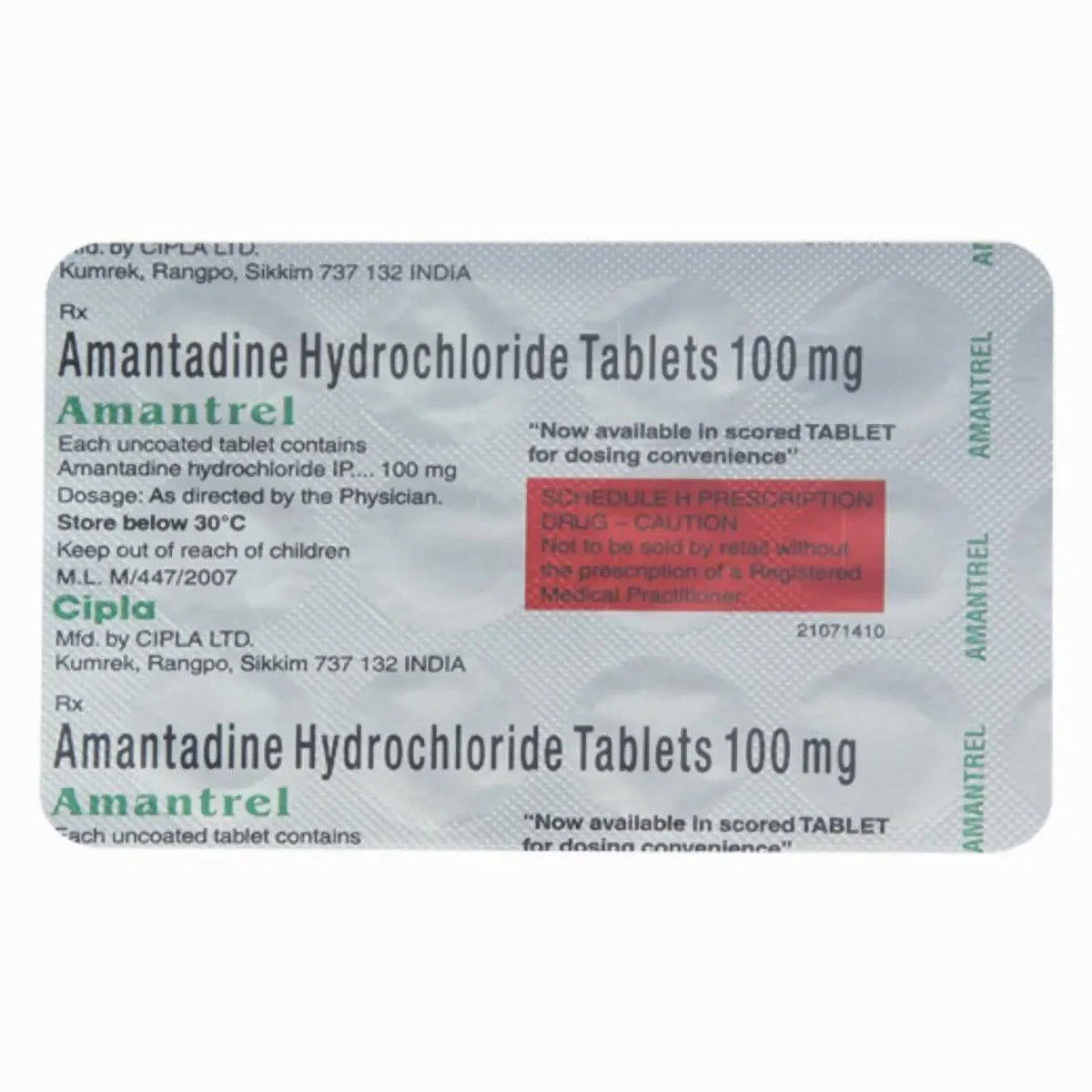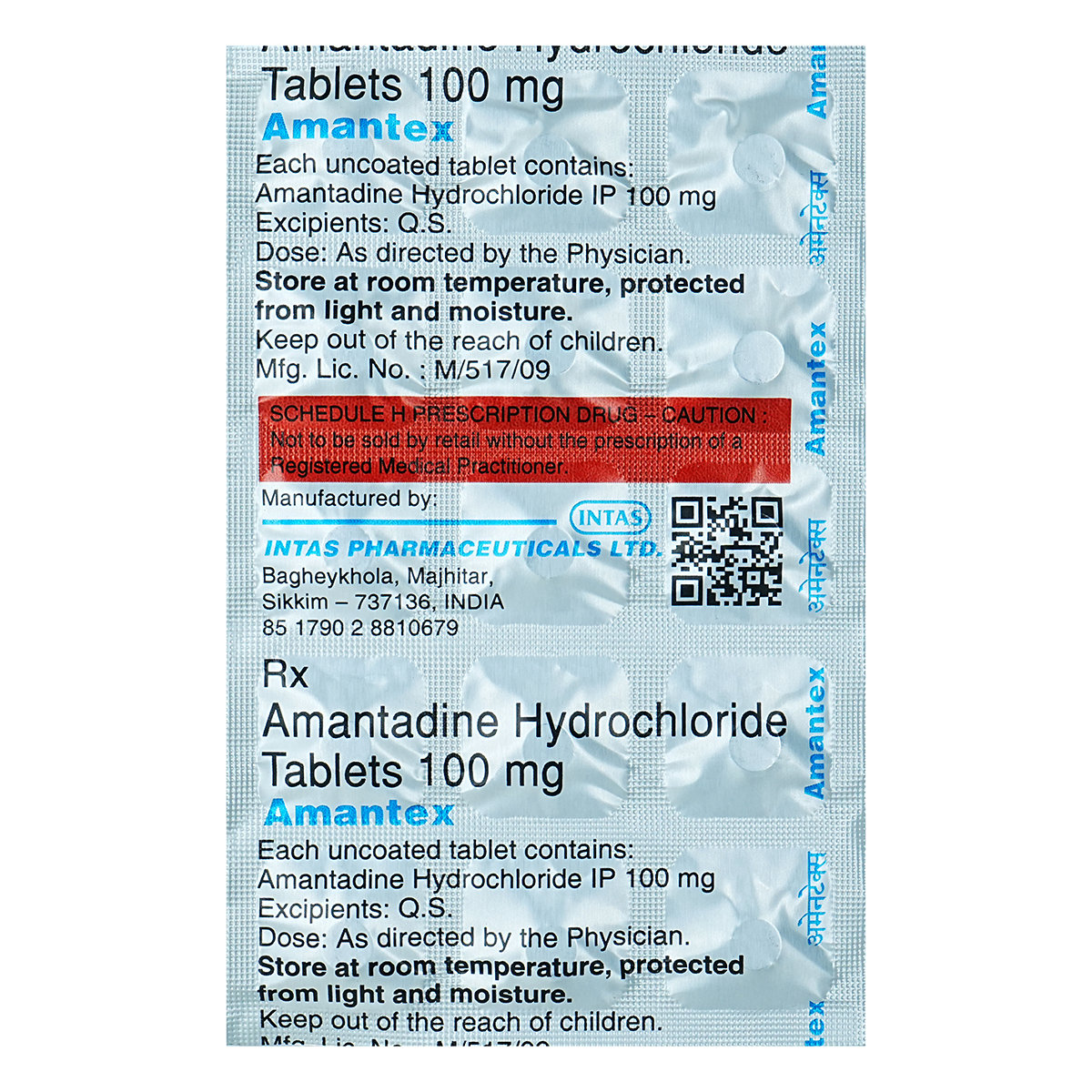Amantadine
About Amantadine
Amantadine contains a class of medication called dopamine agonist used to treat Parkinson's disease symptoms. It plays a vital role in treating symptoms such as difficulty moving, muscle stiffness, and tremors. Parkinson's disease is a nervous system disorder that causes movement, muscle control, balance, and other similar conditions. In addition to this, it also prevents symptoms of influenza (a viral infection).
Amantadine contains amantadine (dopamine agonist), which is an anti-Parkinson's drug. It helps treat Parkinson's disease by increasing dopamine (a chemical) level in the brain, responsible for improving body movement coordination. Thus, it effectively helps in performing daily functions in a better way and improving quality of life. Men are more likely to develop Parkinson's disease.
Amantadine is taken with or without food in a dose and duration as advised by the doctor. The dose you are given will depend on your condition and how you respond to Amantadine. In some cases, you may experience dry mouth, constipation, balance disorder (loss of balance), blurred vision, insomnia (difficulty sleeping), peripheral edema. Most of these side effects of Amantadine are temporary, do not require medical attention, and gradually resolve over time. However, if the side effects are persistent, reach out to your doctor.
Consume only if the doctor prescribes you. Never encourage self-medication or suggest your medicine to someone else. You should not take Amantadine if you are allergic to amandine or any of its ingredients, levocetirizine, or have severe liver or kidney problems, have epilepsy. Check with your doctor if you're pregnant, currently breastfeeding, or taking any other prescribed or non-prescribed medicines. Also, Amantadine does not stop Amantadine abruptly as it may lead to severe side effects. Inform your doctor, and he might lower your dose gradually.
Uses of Amantadine
Medicinal Benefits
Amantadine contains amantadine (dopamine agonist), which is an anti-Parkinson's drug. It helps treat Parkinson's disease by increasing dopamine (a chemical) level in the brain, responsible for improving body movement coordination. Thus, it effectively helps in performing daily functions in a better way and improving quality of life. Parkinson's disease is more likely to occur in men.
Directions for Use
Storage
Side Effects of Amantadine
- Dry mouth
- Constipation
- Balance disorder (loss of balance)
- Blurred vision
- Insomnia (difficulty sleeping)
- Peripheral edema
Drug Warnings
Do not take Amantadine if you are allergic to amantadine or any of its ingredients. Inform your doctor about all other OTC medications, vitamins, nutritional supplements, and herbal products you are taking or are planning to take. If you have kidney or liver disease, mental illness, glaucoma (increased pressure in the eye can lead to a gradual loss of vision), epilepsy, a sleep disorder, eczema (dry, itchy skin with red, scaly rashes), urinary tract infections, heart failure, hypotension (low blood pressure), or if you drink or have ever consumed large amounts of alcohol, Amantadine should be taken with caution and only if a doctor prescribes you. Tell your doctor if you are pregnant or are breastfeeding before starting Amantadine as a dose adjustment may be required if the benefits outweigh the risks. Amantadine may cause dizziness, lightheadedness, and fainting when you get up too quickly from a lying position, especially when you start taking Amantadine so please get up gradually. Also, do not take any live vaccination for at least 48 hours after the last dose of Amantadine. Avoid dairy products as it may cause disease progression, and take some calcium supplements to avoid their deficiency.
Drug Interactions
Drug-drug Interaction: This medicine may have an interaction with anti-depressant medications (bupropion), medication containing iodine, pain killers (tramadol), anticholinergics (benztropine), blood thinners (aspirin), NSAIDs (ibuprofen), anti-epileptic medications (clonazepam, diazepam).
Drug-Food Interaction: Amantadine interacts with non-prescription medications, vitamins, nutritional supplements, and herbal products you are taking or plan to take. Also, alcohol consumption and drinks containing caffeine should not be taken along with Amantadine.
Drug-Disease Interaction: Inform your doctor if you have or have ever had an f you have kidney or liver disease, received a 'live' nasal flu vaccine, heart problem or history of heart disease, alcoholism, mental illness, hypotension (low blood pressure), glaucoma (increased eye pressure), hypotension (low blood pressure), mental illness, psychosis, or suicidal thoughts or actions.
Drug-Drug Interactions Checker List:
Safety Advice

Alcohol
unsafeIntake of alcohol with Amantadine may damage your liver. Therefore, you are recommended to avoid consumption of alcohol with Amantadine.

Pregnancy
cautionAmantadine is a pregnancy Category C medicine. It is not known whether Amantadine will affect pregnant women or fetus. Therefore, Amantadine is given to pregnant women only if doctor thinks benefits are greater than risks.

Breast Feeding
cautionAmantadine is excreted in human milk. But the amount of Amantadine absorbed by the nursing infant is unknown. So, it should not be taken while breastfeeding.

Driving
unsafeAmantadine can affect alertness and coordination. So, operating machinery which requires concentration should be avoided.

Liver
unsafeAmantadine is unsafe, especially if you have a history of liver diseases/conditions. Your doctor may have to adjust the dose if there are symptoms of nausea, vomiting, loss of appetite, dark-colored urine, or yellowing of skin/eye.

Kidney
cautionAmantadine to be taken with caution, especially if you have a history of Kidney diseases/conditions. The dose may have to be adjusted by your doctor.

Children
safe if prescribedAmantadine can be given to children but under medical supervision. Amantadine is prescribed to the children to treat complicated urinary tract infections, anthrax infection, or plague infection.
Habit Forming
Diet & Lifestyle Advise
- Try to include heart-healthy omega 3 fatty acid containing food drinks in your daily diet. You can also use low-fat cooking oil like olive oil, soybean oil, canola oil, and coconut oil.
- Include turmeric or yellow mustard in your diet to avoid constipation caused by Parkinson’s disease and increase the intake of fluids to stay hydrated.
- Caffeine can help in slowing down the progression of the disease.
- Take enough of Vitamin D and fresh air as it is known to improve the symptoms of Amantadine.
Special Advise
Avoid alcoholic beverages with Amantadine as it can make you dehydrated and may affect your sleep.
Patients Concern
Disease/Condition Glossary
Parkinson’s Disease: It is a nervous system disorder that affects movement and coordination. The symptoms start slowly, sometimes with a simple tremor but eventually lead to a slowing movement and unable to coordinate movements. As the disease progresses, the symptoms may become worse.
FAQs
No, Amantadine should be taken in the dose and duration as advised by the doctor. If you take it in more than the recommended dose, it might cause unpleasant side effects. If you think your symptoms are not improving, please consult your doctor.
If you miss a dose of Amantadine, take the missed dose as soon as you remember it. However, if it's almost time for the next dose, do not take a double dose to make up for a missed one.
No, Amantadine should not be taken if you have epilepsy as it might increase your chances of seizures. Please consults your doctor before starting Amantadine.
You should inform your doctor, and he might stop the use of Amantadine before the surgery.
Do not stop taking Amantadine without talking to your doctor. If you suddenly stop taking Amantadine, you may experience confusion, fever, mental state changes, or severe muscle stiffness. Your doctor will probably decrease your dose gradually depending upon your disease condition.








